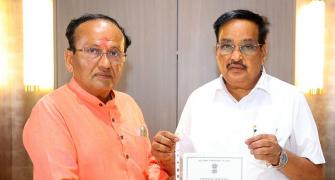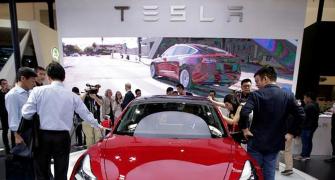Next month, Dell will open a factory in the southern Indian city of Chennai, the U.S. company's first foray into manufacturing in India
Compared to giant tech complexes in China operated by electronics manufacturers such as Hon Hai Precision Industry or Flextronics International, companies that employ tens of thousands of employees at factories producing all sorts of machines, this Dell plant will be modest in scope.
The company has invested just $30 million in the Chennai plant and only has plans to employ about 400 workers to make desktop computers.
Still, this latest addition to Dell's manufacturing team has significance far greater than its small size. According to Stephen J. Felice, Dell senior vice-president and Singapore-based head of Asia-Pacific for the company, India is emerging as one of the most important markets for Dell.
"India is Dell's largest-growing country in the world," he says. Sales amount to $500 million now, Felice says, adding that the company predicts ". . . 50% to 70% year-on-year growth in the foreseeable future."
The Chennai factory is the clearest sign yet that India is emerging as the Next Big Thing in the global PC world. In 2006, there were over 22 million computers in use in India, compared with just 9.5 million in 2003.
That's only one for every 50 Indians. Still, with the number of machines more than doubling in three years, this is a "a watershed era in the history of the Indian PC market," says Kapil Dev Singh, country manager of market research firm IDC, in a recent press statement.
China Slowing, India Gaining
It wasn't too long ago that India was an afterthought for many people in the computer industry. For years, the country took a back seat to China. For good reason: China has quickly grown to become the world's second-largest PC market, after only the U.S., and it's likely to become No. 1 in the next few years.
This year, Chinese are likely to buy 33.6 million desktops, notebooks, servers, and other computers, according to projections from market research group Gartner. For Indian computer buyers, the number is just 8.8 million.
But the market in China is slowing down just as India is accelerating. Both countries will enjoy growth between 16% and 18% this year, says Martin Gilliland, Asia-Pacific research director for Gartner. But next year India will move ahead, he says.
While China's PC market will still enjoy respectable growth of 14%, India's computer sales will grow at a rate higher than 20%. And it won't be a one-year rise. Growth that fast will continue "to at least 2011,"
Until now, Dell hasn't been well positioned to take advantage. In market share, it's in a tie with Acer for fourth place, far behind the market leader Hewlett Packard. Local champ HCL is No. 2, and Lenovo, thanks to the Indian operations it acquired in its 2005 takeover of IBM's (IBM) computer division, is No. 3.
More Choices Available
That's largely because India's tax structure makes it difficult for companies to import computers, with a price tag that has grown by some 10% thanks to import duties. Not surprisingly, HP, HCL, and Lenovo all put together PCs inside India, while Dell has been importing its machines from its manufacturing center in Malaysia.
"If you are importing finished goods, you can be uncompetitive because of duties," says Gilliland. For a company such as Dell that doesn't yet manufacture in India, having to pay import duty "totally blows you out of being competitive in a bid."
Nonetheless, Felice disputes the suggestion that Dell has been an Indian also-ran, pointing out that Dell is No. 1 among large corporate customers in the country, with more than 40% market share among such big buyers. The new Chennai plant will enable Dell, he says, to diversify its customer base.
"Now we can start to really go after the consumer and small-business" markets, he says. The Chennai factory will produce desktop PCs when it opens next month, but Felice says that by the end of the year Dell workers in Chennai will also make notebook PCs. This will enable Dell to provide more choices for local would-be buyers.
Will Its Model Work?
Dell's choice of Chennai is no coincidence. The city has some of India's best infrastructure and is home to other electronics manufacturers such as Nokia, Flextronics, and Hon Hai.
Nissan and Samsung Electronics are among the other multinationals that have chosen Chennai for their Indian manufacturing base, prompting some people to predict that the southern Indian city can become the country's answer to Shenzhen, the southern Chinese manufacturing hub.
Felice says that Dell based its decision in part on the local government's pro-business policies. The local government, in addition to offering the usual types of incentives, also helped the company find a location and work with local villages to ensure that the investment went smoothly.
The politicians won't be able to help too much with the next big challenge, which is making sure that Dell's business grows smoothly. The new factory -- and the new commitment to the Indian market that it represents -- should provide Dell with a boost.
But Dell will face some challenges in India where credit card usage is low and people are not accustomed to buying directly over the Internet. Those facts of life should make it more difficult for Dell to pursue its direct-sales model in India.
But Gartner's Gilliland believes that the challenges are not insurmountable. Indians "have some suspicions" about making purchases online, he says. "But that will go over time." In the meantime, he says, "I see the potential for a massive opportunity" in the Indian PC market.







